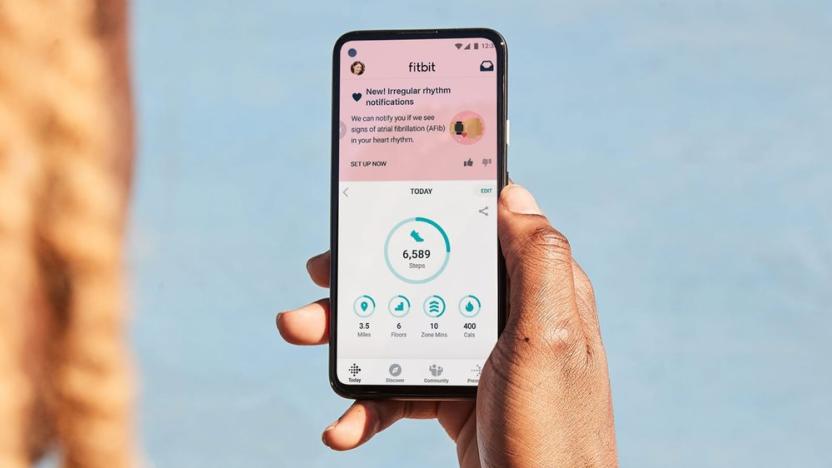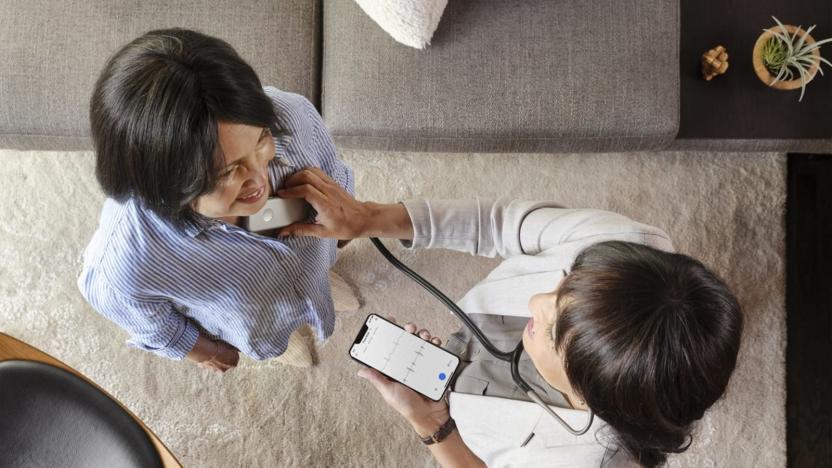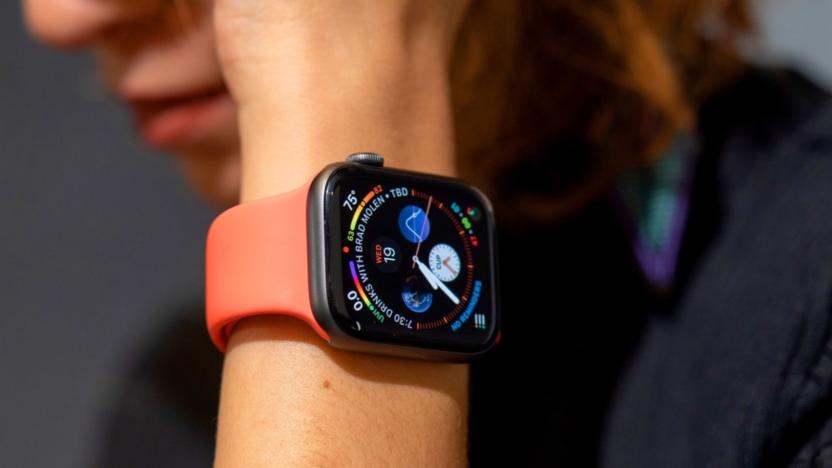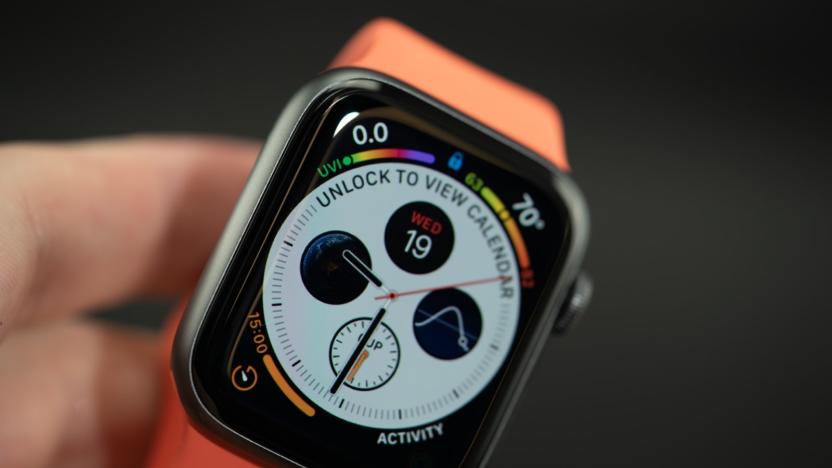electrocardiogram
Latest

Fitbit will roll out a passive heart rhythm monitoring feature after getting FDA approval
Google asked the agency to review its algorithm last month.

Samsung's Galaxy Watch 3 ECG tracking comes to 31 more countries
Samsung has announced that it’s expanding the ECG and blood pressure tracking features in its latest Galaxy Watch models to the UK and Europe, along with Chile, Indonesia and the UAE for 31 new countries in total.

Fitbit will replace some Sense smartwatches due to ECG problem
The company says the bug affects a few hundred units.

Samsung's newest watches can now take ECG readings in the US
Galaxy Watch 3 and Galaxy Watch Active 2 do so with the Samsung Health Monitor app.

Fitbit gets FDA clearance for its Sense smartwatch and ECG app
Fitbit's Sense smartwatch will be able to detect atrial fibrillation when it arrives in October.

Samsung gets approval for Galaxy Watch Active 2's ECG, but only in Korea
Samsung has received approval for the Galaxy Watch Active 2's ECG feature, but only in South Korea so far.

The FDA is fast-tracking an algorithm that screens for heart failure
Today, the FDA granted "breakthrough status" to an algorithm that could make screening for heart failure more accessible -- both in traditional clinics and telehealth settings. The algorithm uses a deep neural network developed by digital health company Eko and Mayo Clinic. With as little as 15 seconds of electrocardiogram (ECG) data, it can identify Left Ventricular Ejection Fraction (LVEF), a measure that's commonly used to diagnose patients with heart failure.

Apple Watch ECG is coming to Canada 'as quickly as possible'
Canucks won't have to sit on the sidelines while their Apple Watch-toting friends in the US, Europe and Hong Kong perform electrocardiograms. Apple has confirmed that it's bringing the Watch Series 4's ECG app and irregular heart rhythm detection to Canada "as quickly as possible" following an approval by Health Canada on May 16th. While the company hasn't narrowed down a time frame, the most likely candidates for a debut are either watchOS 5.3 (which entered beta testing in mid-May) or the expected watchOS 6 release in September.

Apple Watch 4's ECG feature is rolling out today
The Apple Watch 4 stole the show at the Apple event in September, in large part due to its built-in electrocardiogram (ECG). The smartwatch was touted as the first consumer device to pack the function -- which goes one further from detecting a low heart rate to sense a dangerous condition known as an atrial fibrillation. Fast forward almost three months, and The Verge reports that the feature is available today courtesy of the latest watchOS update (5.1.2.), along with an irregular rate notification feature for Apple Watches going back to Series 1.

Apple reportedly extends Watch return period for heart feature issues
Apple is reportedly extending its Apple Watch refund window from two weeks to 45 days -- but only for returns related to heart health features, including the upcoming electrocardiogram app on Apple Watch Series 4. You'll have to make such refund requests through Apple Support rather than in Apple Stores after the usual 14 days, according to an internal document MacRumors obtained.

Nymi bracelet uses biometric heart data to unlock digital and physical doors (video)
Unlike faces and fingerprints, a heart's electrical activity is difficult to fake -- it's a unique and potentially ideal security tool. Bionym is taking advantage of this trustworthiness in its upcoming Nymi bracelet. The wristwear authenticates users through a combination of electrocardiograms and Bluetooth proximity detection; if Nymi recognizes your heart rhythm, it automatically logs you into nearby devices. The bracelet also recognizes gesture commands, and a future developer kit should extend the gadget's usefulness beyond basic security for PCs and smartphones. It could unlock doors or make retail payments, for example. Nymi won't ship until early 2014, but it's already available for pre-order at a $79 early bird price.

AliveCor iPhone app and case promise a portable ECG
It's not available for purchase yet, but AliveCor's iPhone case and app could make a trip to a cardiac specialist for an ECG a thing of the past. The case, which is currently designed for the iPhone 4/4S, is a portable electrocardiogram (ECG). An ECG measures the electrical activity of the heart, usually with a trained cardiologist making the call on finding abnormalities that could be the sign of heart disease. The AliveCor case contains two sensors that are placed on the patients chest, after which the device takes a 30-second reading and uploads the acquired data to secure cloud storage. Once the information is available, a medical professional can access and analyze it. Since people at risk of cardiac disease could essentially self-administer an ECG at any time, AliveCor's product could provide an inexpensive way to do initial screenings and monitoring of heart conditions. Remote monitoring could be done with the device in the future, alerting a patient to take another reading or visit a doctor automatically. At this time, the AliveCor ECG is only available in a US$199 version intended for use on dogs by veterinarians. It has, though, been useful to at least one person -- Scripps cardiologist Dr. Eric Topol used a sample for-human device to examine a passenger who was complaining of chest pain on a flight. The device showed that the passenger was having a heart attack, and the plane made an unscheduled landing so that the person could receive emergency treatment. [via Wired]

New sensor can read your heart from afar, but knows not your feelings
Are you fed up with your current ECG sensor? Tired of all the mess of electroconductive gels, sticky electrodes and tangled wires? How about this: Britain's Plessey Semiconductors offers an ECG sensor that promises heart-monitoring without the hassle. We've seen similar technology before, but according to the company, the Electric Potential Integrated Circuit -- or EPIC, as it's humbly called -- can read heartbeats even through a sweater; future versions might be embedded in hospital gurneys for constant, unobtrusive monitoring. Like an extremely sensitive voltmeter, it detects tiny changes in electric fields, which means it could also be used for Kinect-style motion interfaces. The company even imagines a future system where firefighters can use the EPIC to find humans in a smoke-filled room. If you're thinking, "My, that sounds just like my Deus Ex dreams" -- hey, we're right there with you.

iCard ECG brings heart monitoring to the iOS device of your choice (video)
AliveCor's iPhoneECG case was pretty sweet but, being a case, could only be strapped to an iPhone 4. Doctors content with their 3GS or patients who prefer to hug an iPad to their chest will be elated to hear the company is working on a more hardware-agnostic option for your iOS heart monitoring needs. The business card-sized iCard ECG mounts to the back of your iDevice using velcro and wirelessly feeds data from its electrodes to the AliveECG app. The app automatically records 30 seconds of your heart's rhythmic pulse before uploading it to AliveCor's servers for sharing with your doctors. The bad news? They're still awaiting FDA approval, so you can't run out and pick one up just yet. But, when it does hit shelves, it looks like you'll have a choice of red or black -- so you can make sure your medical accessories match your scrubs. Check out the video after the break.

iPhonECG case monitors your heart rate to make sure you're appropriately excited about CES
CES isn't just about incrementally thinner or faster hardware, you know. Some people like to bring legitimately innovative ideas to the show, such as this iPhonECG case, which does what its name suggests: it takes an ECG (electrocardiogram) reading of your heart's activity through a pair of electrodes and then communicates its findings to an iPhone 4 it can be attached to. We say it can be attached to an iPhone as communication is done wirelessly, so you'll probably be able to monitor your ticker's rhythm without the Applephone pressed against your bosom. Then again, maybe you like that. It's a free world, we don't judge. We'll be sending out our most hairy-chested editor to give this thing a proper test at the Las Vegas convention next week. Until then, scope out the video after the break.

Wearable ECG uses patient's posture for encryption, transmits data over Body Area Network
Though its fun to think of the Body Area Network as another way for cheap employers to get out of paying for properly wiring your workspace, the most obvious uses for this technology would seem to be in the realm of health care. To this end, the National Institute of Information and Communications Technology (NICT) in Japan has developed an ECG that can be worn 24 hours a day, wirelessly transmitting electrocardiographic data as well as measuring changes in body surface temperature and posture. The data can even be transmitted securely using cryptographic keys dynamically generated by the patient's posture and biological data (which are unique to each user). We'll let you guys ponder the cypherpunk ramifications of this technology in the comments -- and be sure to check out the additional pic we have for you after the break.

Daring DIY'er devises homegrown heart monitoring device
While there's already a plethora of safe, proven methods to monitor your heart rate, there's just no satisfaction in buying an off the shelf BioShirt when you know you possess the skills (and spare time) to craft a system of your own. Interested in making his own mark in biomedical engineering, a crafty individual set out to build his own electrocardiograph for nothing more than fun, but rather than keeping his homegrown work all to himself, he busted out a set of instructions in order for us less inventive souls to replicate the process. Aside from creating an ECG board, reading results with LABView, and having the nerve to actually strap leads to your body and hope that you don't electrocute yourself, there's still a good bit of coding and behind the scenes work necessary to pull this off. So if you never got around to going to medical school, but you know you've got the DIY skills to operate a heart monitoring system in your home office, be sure to hit the read link and read that blurb about "destroying your nervous system" real carefully.[Via MAKE]

Electrocardiogram on a laptop, just what we always wanted
Look, this whole electrocardio business is all well and good, but we must confess our initial disappointment when we realized that the little display on the left palm rest of this laptop was no SideShow apparatus -- though we suppose you already knew how we feel about that little bit of Vista goodness that is SideShow. All the same, there ain't much wrong with this HATO NB electrocardiogram doohicky that MSI slapped onto its latest laptop. The included electrodes can be hooked up to your aesthetically pleasing lady friend, allowing the laptop to record her vitals or even allowing a doctor to remotely examine the patient. You can also print out information the gadget gathers, or place the data on an SD card for doctor perusal. The rest of the details on this thing are sadly lost in machine translation, but it looks like MSI will be showing it off at CES next week, so we'll keep an eye out.









